Top Grants for Small Nonprofits in 2025 to Fund Your Mission
Discover the best grants for small nonprofits in 2025. Find funding opportunities to support your mission and grow your organization today!
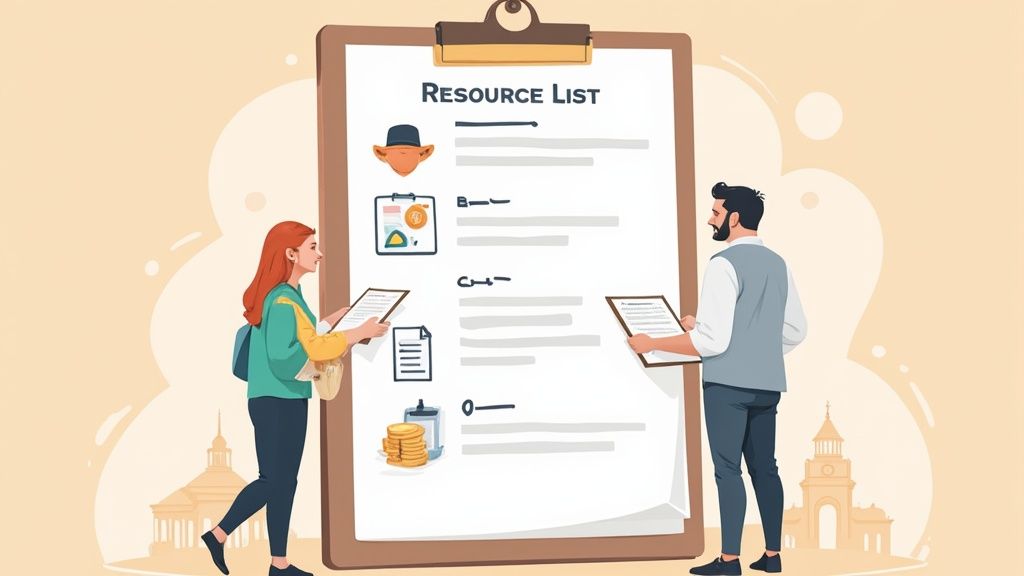
For small nonprofits, every dollar counts, and grants are the lifeblood that transforms ambitious goals into tangible community impact. But navigating the complex world of federal portals, foundation directories, and corporate giving programs can feel overwhelming. Many promising organizations get stuck in the research phase, unsure where to look or how to identify funders that align with their mission.
This guide is designed to cut through that noise. We have curated and analyzed the most effective and accessible resources-from comprehensive federal databases to specialized subscription services-that provide grants for small nonprofits. We will move beyond simple descriptions to offer practical insights on how to use each platform, what its limitations are, and how it fits into a sustainable grant-seeking strategy. Each entry includes direct links to help you get started immediately.
Think of this as your roadmap to finding the right funding opportunities. We'll show you exactly where to look so you can spend less time searching and more time focusing on what truly matters: making a difference. This curated list will help you pinpoint the best grant sources for your organization's unique needs and build a powerful funding pipeline.
1. Grants.gov
As the official portal for all U.S. federal grant-making agencies, Grants.gov is the single most comprehensive and authoritative source for federal funding opportunities. It centralizes thousands of grant notices from departments like the Department of Health and Human Services, the National Endowment for the Arts, and the Environmental Protection Agency, making it an essential starting point for any nonprofit seeking government support. Small nonprofits, in particular, can leverage its powerful search filters to find grants specifically designated for smaller organizations or specific community-based initiatives.
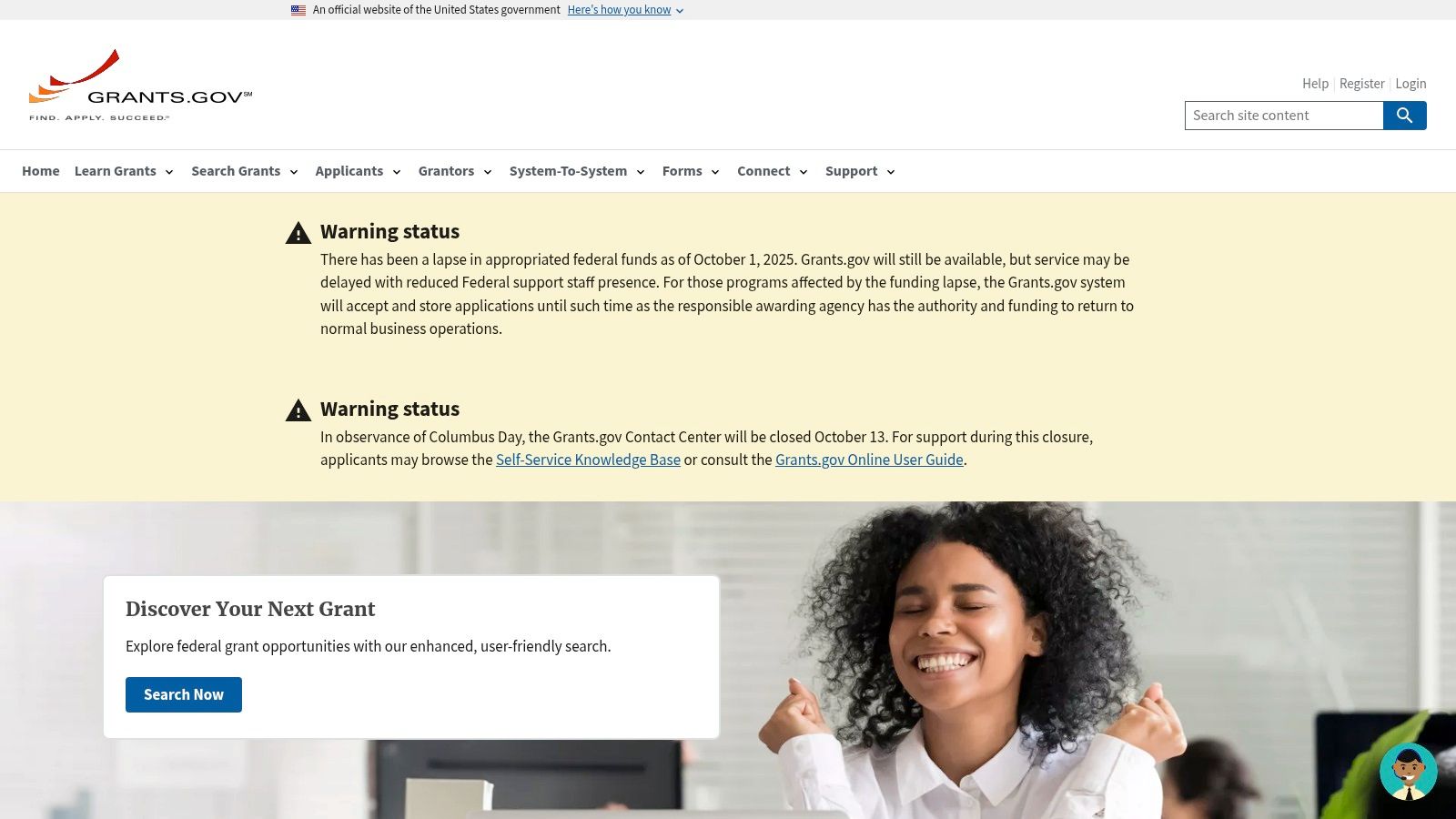
The platform is entirely free to use but requires several time-consuming registrations before you can apply. Navigating the federal application process can be complex, so it's a good idea to understand the full grant lifecycle. For a deeper dive into using this essential tool, explore our guide on how to find grants for nonprofits.
Key Features & Considerations
- Access: Completely free to search and apply.
- Registration: Crucial Tip - The registration process (obtaining a UEI, registering with SAM.gov, and creating a Grants.gov account) can take several weeks. Start this process long before you intend to apply for any grants for small nonprofits.
- Workspace Feature: This collaborative tool allows your team to work on different parts of a federal application simultaneously, streamlining a notoriously complicated process.
- Limitations: The platform is exclusively for U.S. federal grants. The application requirements are often rigorous and highly competitive, which can be a significant hurdle for organizations without a dedicated grant writer.
Website: https://www.grants.gov
2. SAM.gov Assistance Listings (formerly CFDA)
While Grants.gov is where you apply for federal funding, the Assistance Listings on SAM.gov (System for Award Management) is where you do your homework. This comprehensive catalog details all federal assistance programs, including grants, loans, and other financial aid. It allows small nonprofits to research the purpose, eligibility requirements, and historical awardees of various programs long before a specific funding opportunity is even announced. This strategic approach helps you identify which federal agencies are most aligned with your mission.
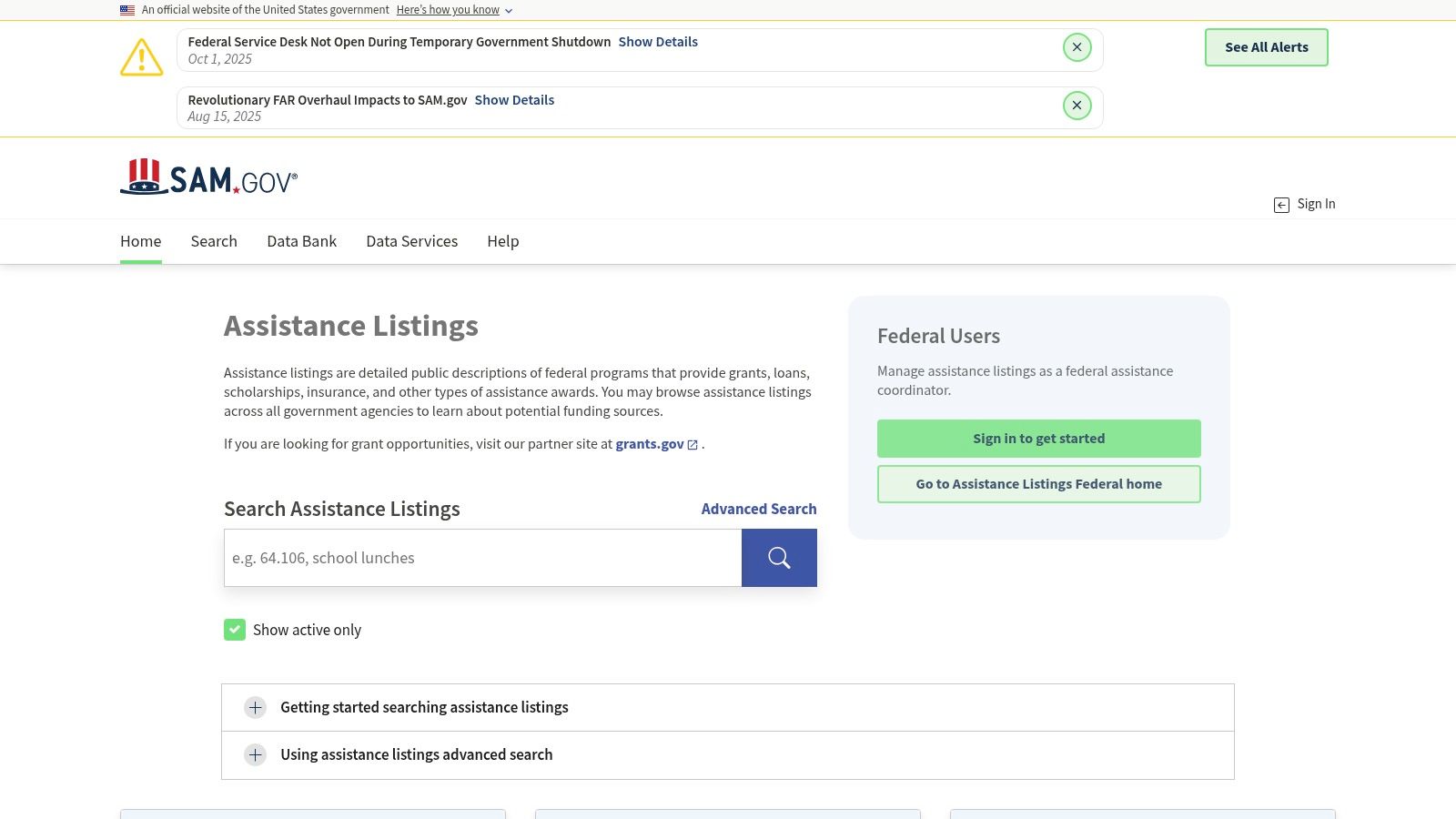
Think of it as the strategic precursor to Grants.gov. By understanding the parent programs, you can better anticipate future grant releases and prepare your materials in advance. This foreknowledge is a significant competitive advantage when searching for grants for small nonprofits, as it allows you to be ready the moment a relevant Notice of Funding Opportunity (NOFO) is posted. The site is a free, government-maintained reference tool essential for proactive grant-seeking.
Key Features & Considerations
- Access: Completely free to search and download data.
- Strategic Research: Crucial Tip - Use the "Historical" award data for a program to see which organizations have been funded in the past. This can reveal patterns in funding priorities and typical award amounts.
- Program Clarity: Each listing provides a detailed overview of a program's objectives and eligibility, helping you determine if it's a good fit for your organization before you invest time in an application.
- Limitations: This is not an application portal; all active opportunities will link out to Grants.gov. The information can be high-level, and the timing of actual funding announcements based on these listings can be unpredictable.
Website: https://sam.gov/assistance-listings
3. Candid – Foundation Directory (Candid Search)
While Grants.gov covers federal funding, Candid's Foundation Directory is the premier database for researching private, corporate, and community foundation grants. It provides unparalleled depth, offering detailed profiles on funders, their past giving history, key personnel, and even copies of their 990 tax forms. For small nonprofits, this platform is the gold standard for identifying and qualifying foundation prospects that align with their mission, ensuring they don't waste time applying to funders who are a poor fit.
The database is a paid subscription service, which can be a barrier for some. However, Candid partners with over 1,000 libraries and community centers worldwide to provide free on-site access. The platform's powerful search and analytics tools help organizations strategically find the best-fit grants for small nonprofits by analyzing a funder's past giving patterns and interests.
Key Features & Considerations
- Access: Requires a paid subscription, but free access is available at partner locations (Funding Information Network).
- Funder Research: Crucial Tip - Use the "Past Grants" search to see exactly which organizations a foundation has funded and for how much. This is the most reliable way to determine if your nonprofit is a good match.
- Comprehensive Profiles: Go beyond basic grant listings with access to funder financials, giving limitations, and application guidelines, which is invaluable for strategic prospecting.
- Limitations: The subscription cost can be prohibitive for nonprofits with very tight budgets. The sheer volume of data can also present a learning curve for new users trying to maximize its search capabilities.
Website: https://candid.org/find-funding/fdo
4. Philanthropy News Digest (PND) – RFPs and Notices
As an editorial service of Candid, Philanthropy News Digest (PND) offers a constantly updated feed of Requests for Proposals (RFPs) from foundations and corporations. This makes it an invaluable resource for nonprofits looking to tap into private funding streams. Instead of housing a massive database, PND functions more like a news hub, posting daily announcements that often highlight new or specific funding initiatives, which is perfect for discovering timely opportunities.
This free platform is particularly useful for small nonprofits that need to quickly identify active grant cycles without subscribing to expensive databases. Its straightforward, chronological listings with clear summaries allow fundraising teams to efficiently scan for relevant opportunities and click through directly to the funder's website for detailed guidelines. It's an excellent first stop for tracking the pulse of foundation and corporate giving.
Key Features & Considerations
- Access: Completely free to browse all posted RFPs and subscribe to the weekly newsletter.
- Timeliness: Crucial Tip - Check the site or subscribe to the weekly RFP email bulletin to stay ahead of deadlines. New opportunities from private and corporate funders are posted daily.
- Direct Sourcing: PND provides concise summaries but always links directly to the funder’s official announcement, ensuring you get accurate, first-hand information for your application.
- Limitations: The platform only lists publicly announced RFPs, which represent a small fraction of all foundation giving. Many foundations give without a formal RFP process, so this shouldn't be your only source for finding grants for small nonprofits.
Website: https://philanthropynewsdigest.org/rfps
5. Instrumentl
Instrumentl is an all-in-one grant platform that combines a comprehensive database with powerful project management tools. It aggregates opportunities from private, corporate, and government sources, using smart matching to connect your nonprofit’s mission with active funders. This approach saves countless hours of manual prospecting, making it an invaluable resource for small teams trying to build a sustainable funding pipeline. Its strength lies in moving you beyond just finding grants to actively managing them from prospect to report.
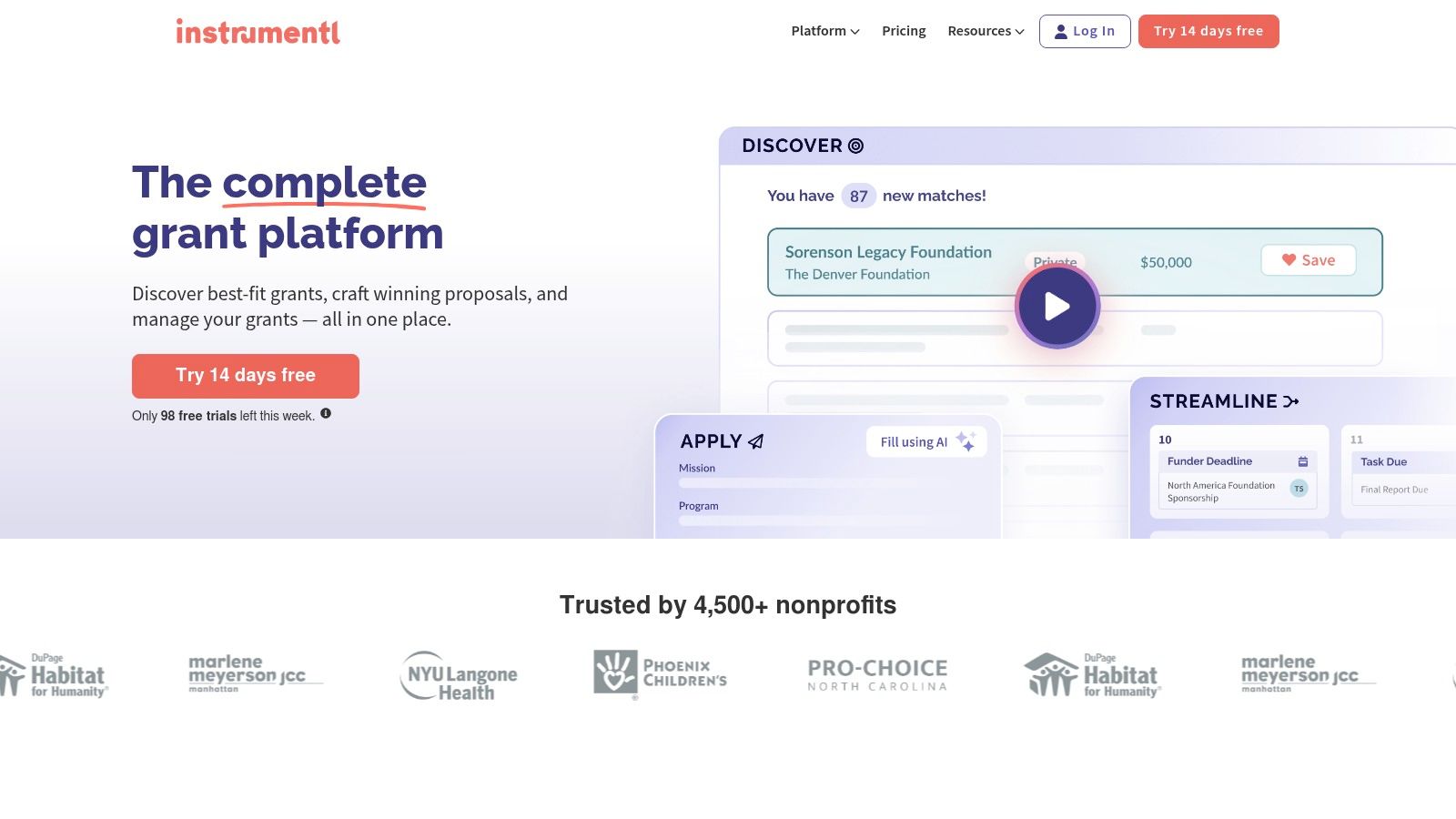
The platform is a premium, subscription-based service, but it offers a 14-day trial to test its features. The unified system helps track deadlines, store documents, and manage funder relationships in one place. By centralizing the entire grant lifecycle, Instrumentl helps ensure that important tasks and deadlines for grants for small nonprofits are never missed, transforming a chaotic process into a streamlined workflow.
Key Features & Considerations
- Access: Subscription-based with several pricing tiers; a 14-day free trial is available.
- Smart Matching: Crucial Tip - Be highly specific when setting up your project profile. The more detail you provide about your programs, location, and funding needs, the more accurate and relevant your grant matches will be.
- Integrated Workflow: The platform includes built-in tools for tracking proposals, reporting deadlines, and storing funder information, eliminating the need for separate spreadsheets.
- Limitations: The subscription cost can be a barrier for nonprofits with very tight budgets. To get the most value, your team must commit to consistently using the platform for tracking all grant-related activities.
Website: https://www.instrumentl.com
6. GrantStation
GrantStation is a long-established grant discovery platform that focuses on providing curated, vetted funding opportunities. It stands out by combining its grantmaker database with extensive educational resources, including guides, tutorials, and templates specifically designed to help smaller organizations succeed. This blend of tools makes it a powerful resource for nonprofits that are new to the grantseeking process or lack a dedicated development team.
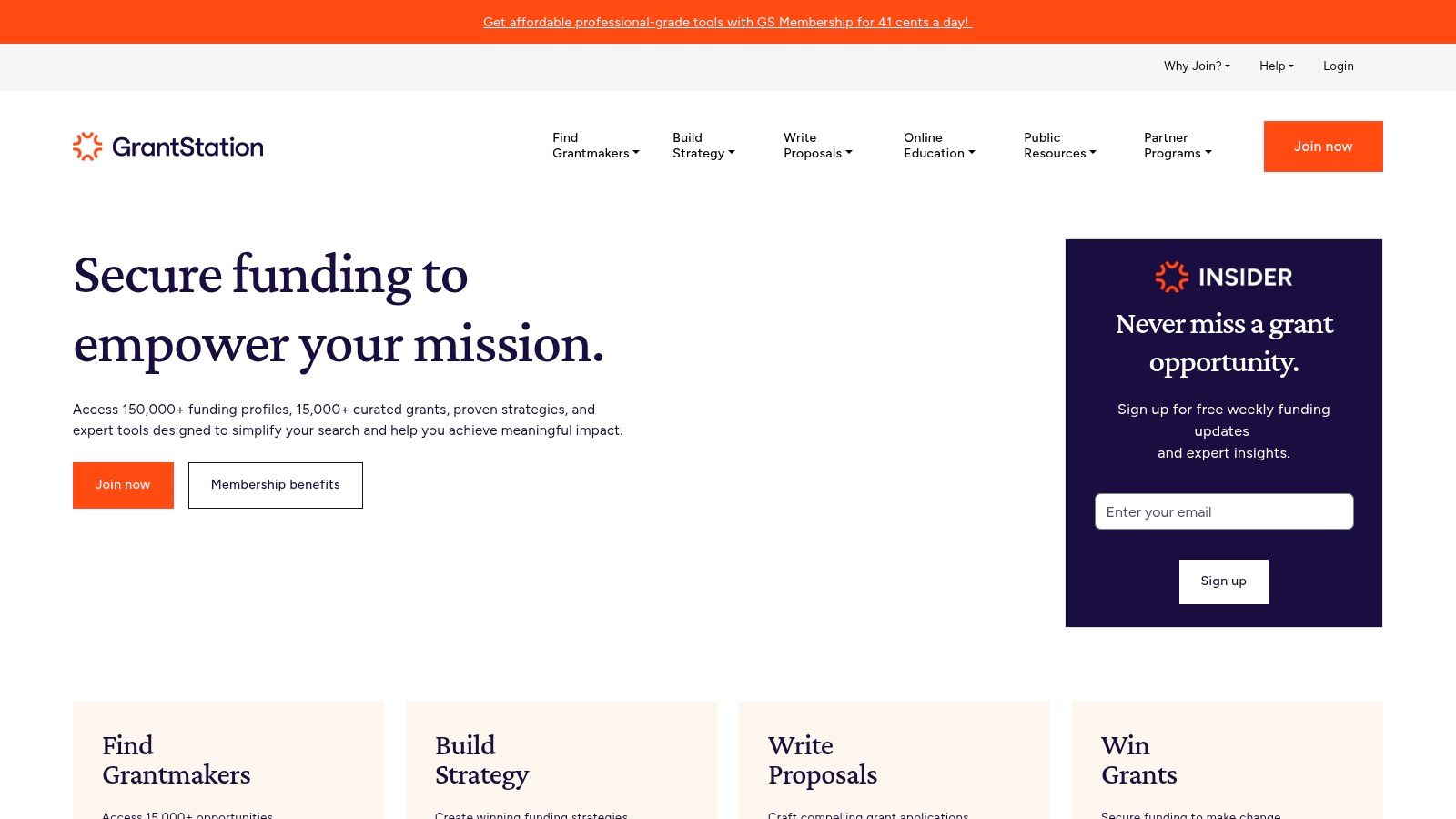
The platform offers a membership-based service, but its frequent promotional pricing often makes it one of the more accessible paid databases for organizations on a tight budget. For those just starting out, GrantStation's step-by-step proposal guides are invaluable. To build on these foundational skills, check out our complete guide on grant writing for beginners.
Key Features & Considerations
- Access: This is a paid subscription service, but it's known for offering significant discounts throughout the year.
- Curated Listings: Crucial Tip - Unlike massive, unvetted databases, GrantStation's team vets its listings, which saves you time and helps you focus on high-quality opportunities for your small nonprofit.
- Educational Resources: The platform includes comprehensive tutorials and strategic guides that walk users through the entire grantseeking lifecycle, from research to writing the final proposal.
- Limitations: The user interface and data depth are less advanced than some of the more expensive, analytics-heavy platforms. The pricing can fluctuate, so it's wise to watch for promotional offers.
Website: https://grantstation.com
7. GrantWatch
GrantWatch is a massive, frequently updated subscription database that aggregates grant opportunities from federal, state, and local governments, as well as foundations and corporations. Unlike government-only portals, it offers a broader spectrum of funding sources, which is particularly beneficial for small nonprofits looking for diverse support. The platform excels at simplifying the search process with user-friendly summaries, clear eligibility requirements, and direct links to funder websites, saving valuable time for resource-strapped teams.
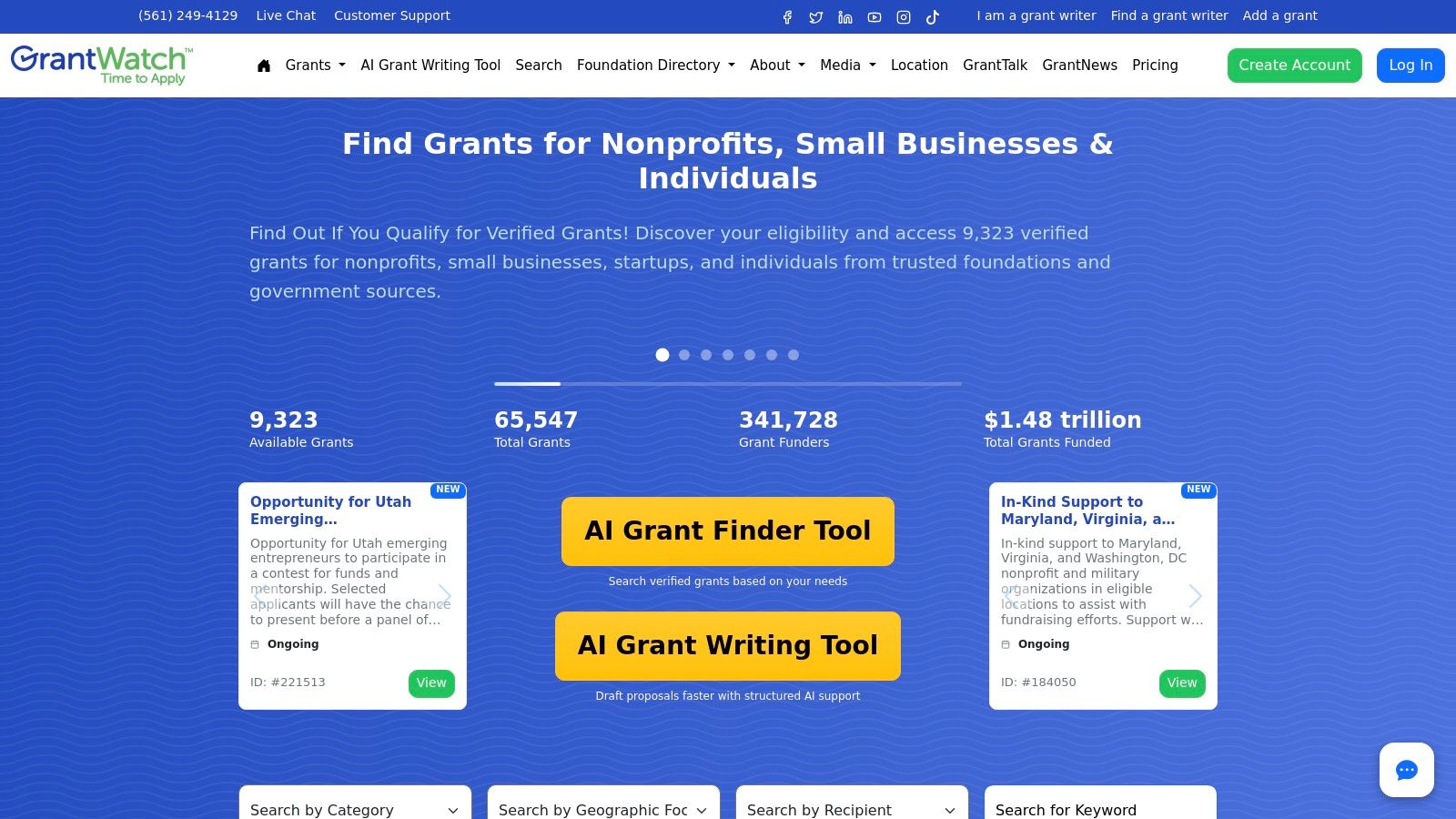
While you can browse headlines for free, full access to grant details and application links requires a paid subscription. This model makes it a powerful but premium tool for organizations ready to invest in their grant-seeking efforts. Its focus on providing scannable, actionable information makes it a standout choice for quickly identifying relevant grants for small nonprofits without sifting through complex government documents.
Key Features & Considerations
- Access: A paid subscription is required for full access to grant details. Plans vary in price based on duration.
- Practical Details: Crucial Tip - Use the easy-to-read grant detail pages to quickly screen opportunities. The summaries are designed to help you decide if a grant is a good fit before you visit the funder's official site.
- Personalized Alerts: The platform allows you to set up email alerts based on your specific funding categories and geographic location, ensuring you never miss a relevant deadline.
- Limitations: As a third-party aggregator, information can occasionally be outdated. Always verify deadlines and eligibility directly on the funder's website before beginning an application.
Website: https://www.grantwatch.com
8. OpenGrants
OpenGrants positions itself as an affordable, all-in-one grant-seeking ecosystem, combining a comprehensive database with a marketplace for expert help. It uses AI to match nonprofits with relevant funding opportunities and provides basic grant management tools to track progress. What makes it unique is its integrated marketplace, allowing organizations that lack in-house expertise to easily find and hire vetted, independent grant writers for specific projects. This model is particularly beneficial for small nonprofits needing on-demand support without the cost of a full-time staff member.
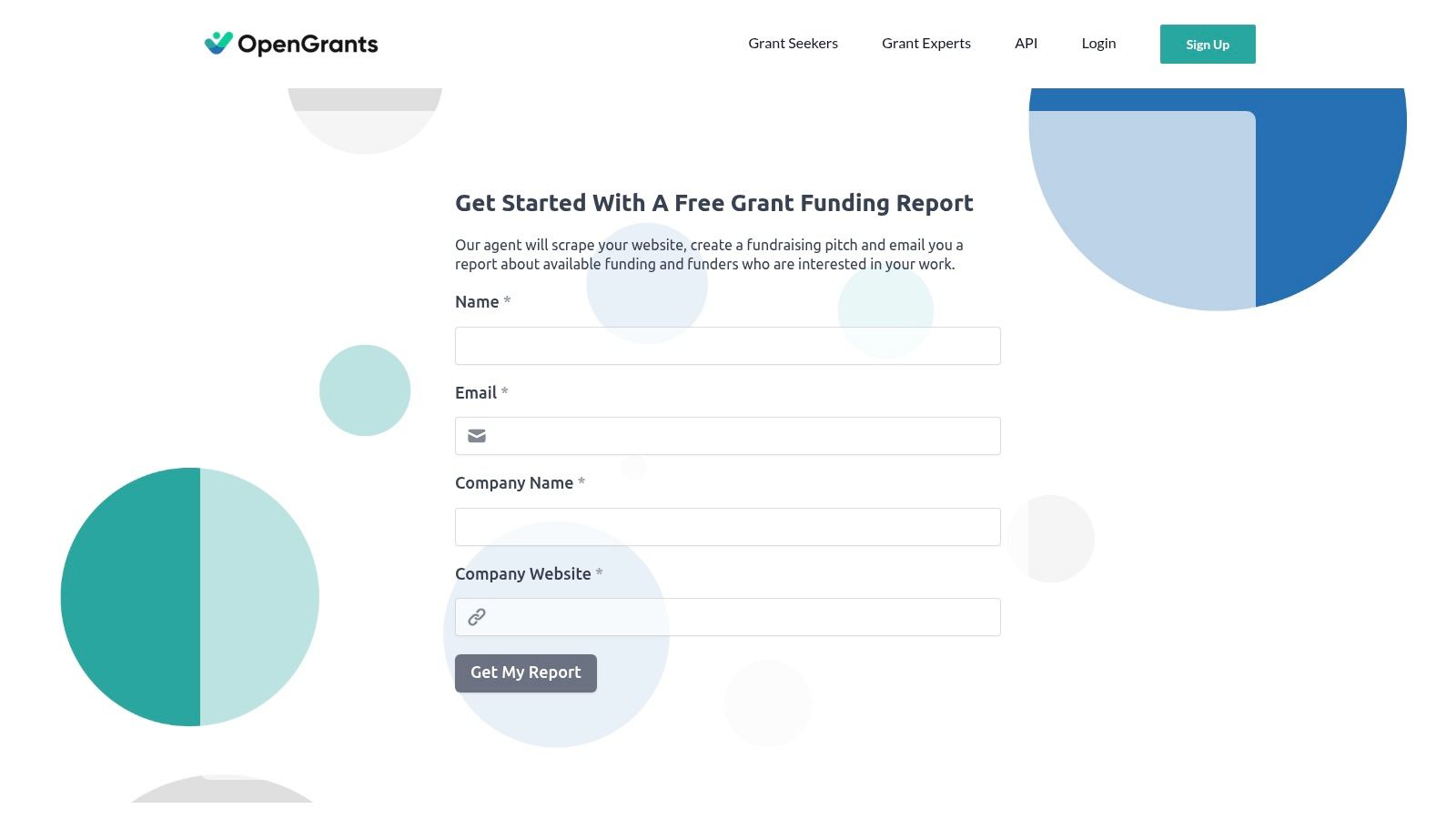
The platform aims to streamline the entire grant lifecycle, from initial search to final application. Its focus on combining technology with human expertise makes it a practical choice for organizations looking to scale their grant-seeking efforts efficiently. The combination of discovery tools and a consultant network offers a flexible solution for finding grants for small nonprofits.
Key Features & Considerations
- Access: Subscription-based with a 7-day free trial; pricing is designed to be accessible for smaller organizations.
- Consultant Marketplace: Crucial Tip - This feature allows you to hire freelance grant writers directly through the platform. Be sure to vet consultants based on their success rates and experience within your specific sector.
- AI-Powered Tools: The platform includes an AI Grant Helper and Grant Writer assistant to help refine proposals and match your mission to the best-fit funders from its database of over 15,000 profiles.
- Limitations: As a newer platform, the depth of grant listings can vary by category. Hiring consultants is an additional expense on top of the subscription fee, so be sure to budget accordingly.
Website: https://opengrants.io
9. Grant Gopher
Grant Gopher is a grant listing database designed specifically with smaller organizations in mind, including small nonprofits, schools, and local governments. Its primary strength lies in surfacing local and state-level funding opportunities that often get lost on larger, federally focused platforms. By offering a clean interface and the ability to search by state, county, or program area, it helps resource-strapped teams quickly identify relevant funders in their immediate community.
The platform streamlines the initial discovery phase of grant seeking, providing straightforward summaries, verified deadlines, and direct links to funder websites. This focus on smaller, more accessible opportunities makes it a practical tool for organizations that may not have the capacity to compete for highly complex federal grants. It's a valuable resource for finding grants for small nonprofits that are geographically or programmatically niche.
Key Features & Considerations
- Access: Offers a free plan with limited search capabilities and a paid "Pro" plan for advanced features like saved searches and email alerts. Pricing is not publicly listed on the website.
- Local Focus: Crucial Tip - Use the county-level search filter to uncover hyper-local foundations and community grants that are often less competitive and more aligned with grassroots initiatives.
- Verified Deadlines: The platform verifies application deadlines, saving users time and preventing them from pursuing expired opportunities.
- Limitations: The Pro plan does not appear to offer a free trial, requiring a commitment to unlock its full potential. The service is primarily built for single-organization users rather than freelance grant writers or consultants managing multiple clients.
Website: https://grantgopher.com
10. Google Ad Grants (In-Kind Grant)
For nonprofits looking to boost their online visibility, the Google Ad Grants program offers a unique and powerful resource. This in-kind grant provides eligible 501(c)(3) organizations with up to $10,000 per month in free Google Search advertising credits. This funding can be used to attract donors, recruit volunteers, and promote programs by placing your organization's website at the top of Google search results for relevant keywords, making it one of the most impactful marketing grants for small nonprofits available.
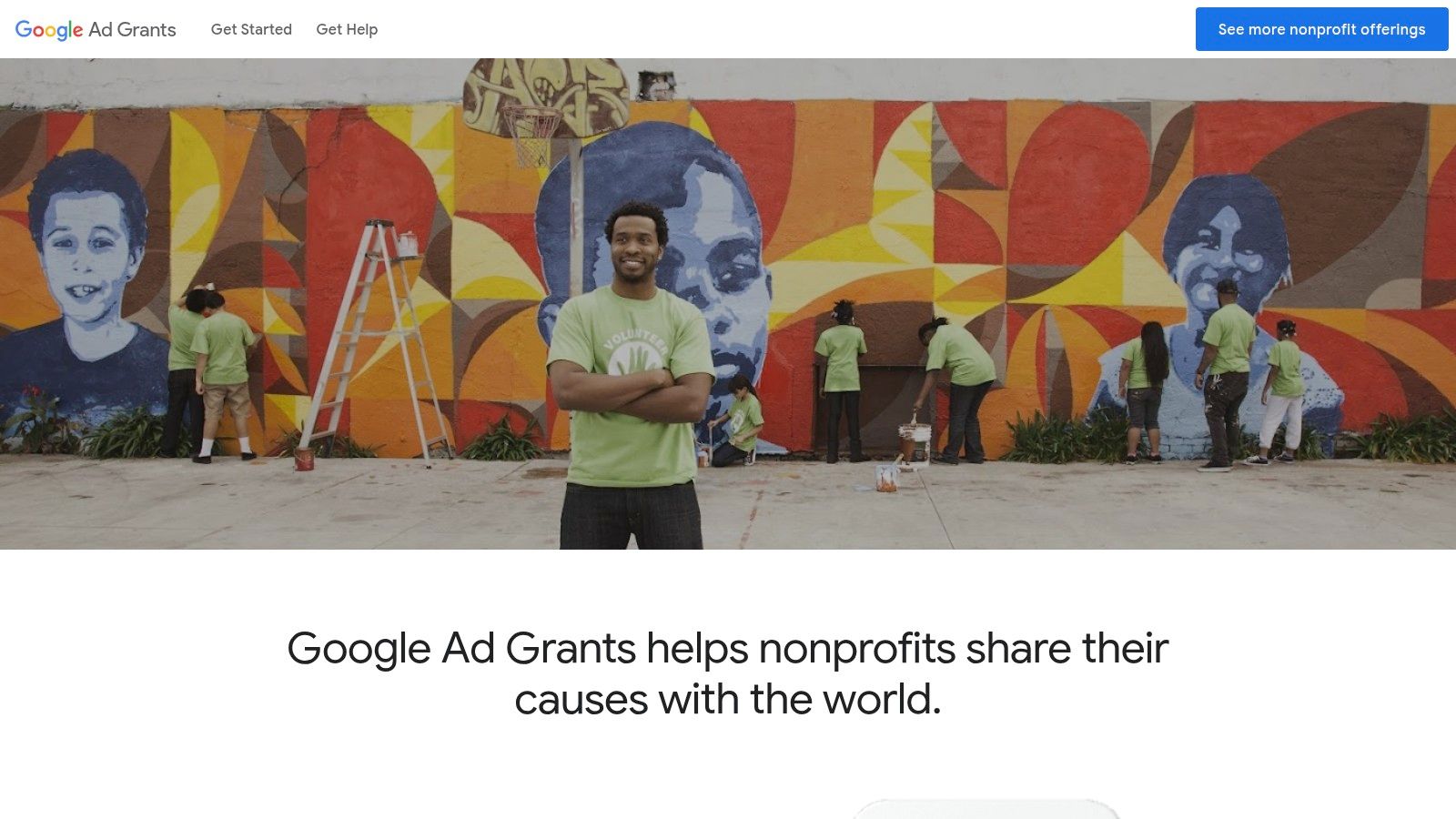
The program is accessed through the Google for Nonprofits portal after a straightforward eligibility verification process. While the grant itself isn't a cash award, the value it provides in driving targeted traffic to your website can be transformative for fundraising and awareness campaigns. Effectively managing these ads is key, and it helps to have a solid understanding of how to frame your mission, similar to the skills needed for writing grant proposals for nonprofits.
Key Features & Considerations
- Access: The ad credits are free for eligible 501(c)(3) nonprofits.
- Value: Provides up to $10,000 per month ($120,000 annually) in in-kind search advertising. This is a continuous grant as long as compliance is maintained.
- Management: Crucial Tip - To maintain eligibility, you must actively manage the account, maintain a 5% click-through rate, and adhere to all program policies. It often requires someone with digital marketing or Google Ads experience.
- Limitations: Ads are text-only and appear exclusively on Google Search results pages. The grant cannot be used for display, video, or shopping ads, which can limit broader marketing strategies.
Website: https://www.google.com/grants/
11. Walmart Spark Good Local Grants
For nonprofits focused on hyper-local impact, Walmart’s Spark Good Local Grants program offers an accessible funding stream directly from local Walmart and Sam’s Club stores. This initiative empowers store managers to support community projects with awards typically ranging from $250 to $5,000. It’s an ideal opportunity for organizations needing support for specific local needs, like funding a food pantry, a youth sports program, or a community clean-up event.
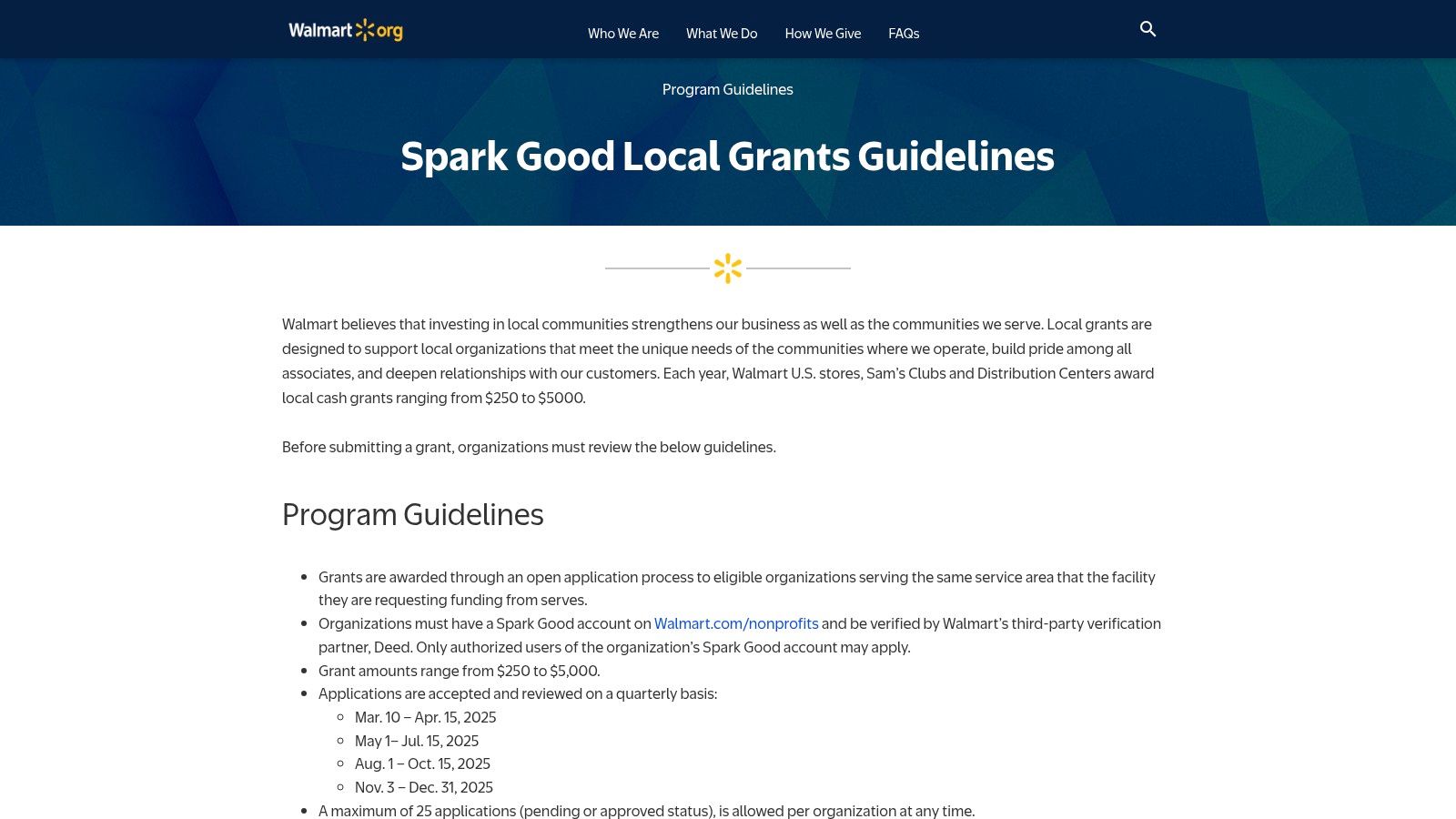
The program's strength lies in its simplicity and local focus, removing the complexity of larger corporate grant applications. Decisions are made at the community level, making it one of the more straightforward grants for small nonprofits to pursue. The online portal is user-friendly, guiding applicants through a streamlined process with clear guidelines and quarterly deadlines, making planning and submission predictable.
Key Features & Considerations
- Access: Free to apply for all eligible 501(c)(3) organizations, schools, and churches.
- Local Focus: Crucial Tip - All applications are submitted to and decided by specific local stores or clubs. You must operate within the service area of a Walmart or Sam’s Club to be eligible.
- Quarterly Cycles: Applications are accepted during four distinct periods throughout the year, providing multiple opportunities to seek funding. Check the website for the exact dates of each cycle.
- Limitations: Funding is highly localized and competitive due to the high volume of applications. Organizations are limited to a certain number of approved grants per fiscal year from the program, so strategic timing is important.
Website: https://www.walmart.org/how-we-give/program-guidelines/spark-good-local-grants-guidelines
12. Community Foundation Locator (Council on Foundations)
Community foundations are one of the most reliable sources of funding for place-based initiatives, and the Council on Foundations' Locator is the fastest way to find them. This free national directory allows you to search for community foundations by state, providing a direct link to local funders deeply invested in the well-being of the areas they serve. For small organizations, this tool is invaluable for identifying grants for small nonprofits that are often less competitive and more focused on grassroots impact than national opportunities.
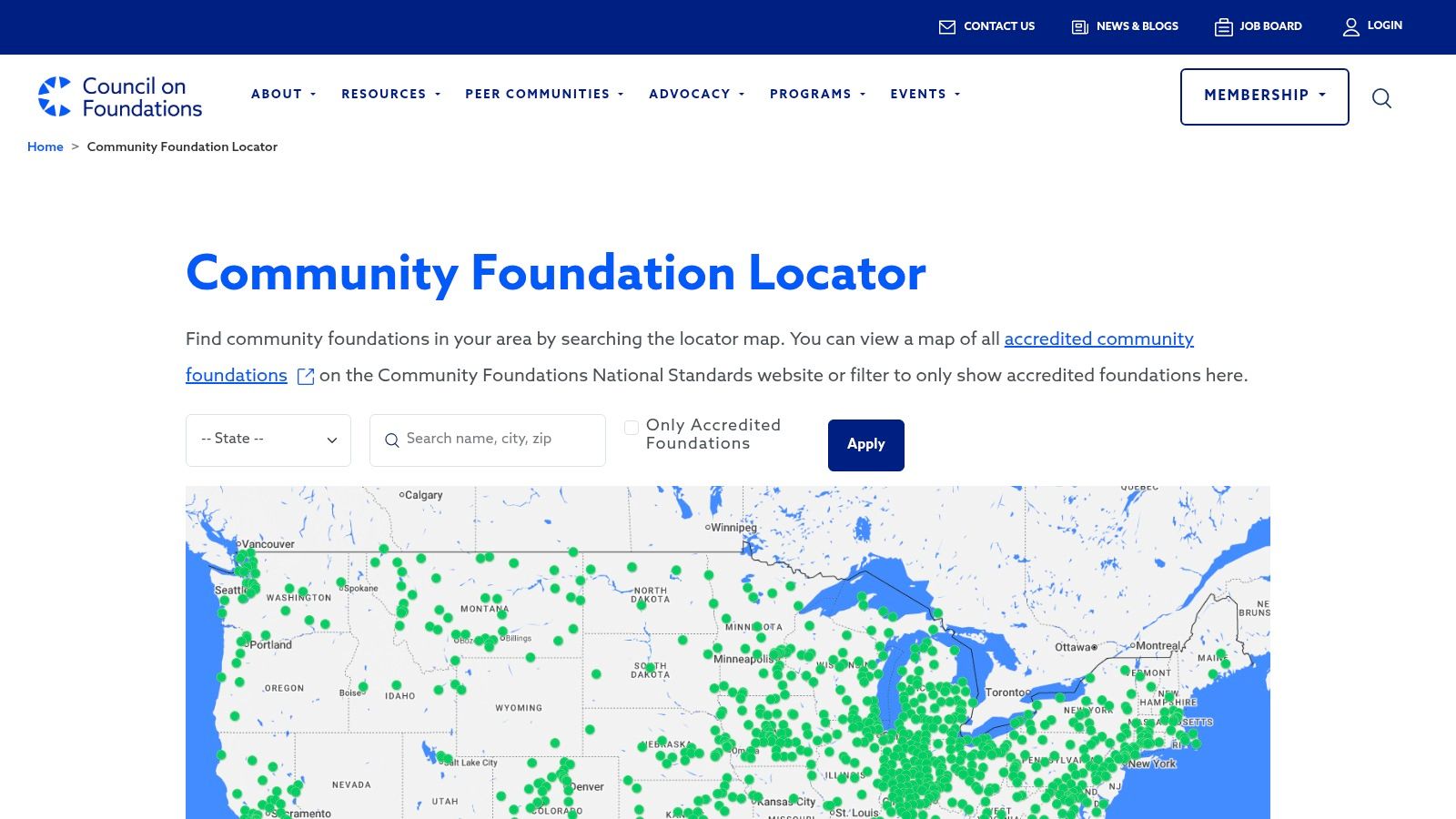
Unlike a centralized grant database, the Locator acts as a high-quality referral service. Its primary function is to connect you with your local foundation's website, where you will find their specific grant guidelines, deadlines, and application processes. This approach encourages building direct relationships with program officers, a key strategy for long-term funding success in your community.
Key Features & Considerations
- Access: Completely free to use.
- Local Focus: Crucial Tip - Use this tool to build a targeted list of local foundations. Research each one individually to understand their funding priorities before reaching out, as this will significantly increase your chances of success.
- Direct Connection: The directory links you straight to each foundation’s website, eliminating the middleman and ensuring you get the most accurate and up-to-date grant information.
- Limitations: This is not a grant search engine; it's a directory. You must visit each individual foundation's site to find open grant opportunities, which requires more manual effort than using an aggregated database.
Website: https://cof.org/community-foundation-locator
Grant Resources Comparison for Small Nonprofits
From Prospecting to Proposal: Building a Sustainable Grant Strategy
Navigating the world of grants for small nonprofits can feel like an overwhelming journey, but as this guide has shown, you are far from alone. From the comprehensive federal databases of Grants.gov to the community-focused opportunities found through the Community Foundation Locator, a vast landscape of funding is available to organizations with a clear mission and a strategic approach. The key is to move beyond simply identifying opportunities and toward building a robust, sustainable grant-seeking system.
The tools we have explored, such as Instrumentl and GrantStation, offer powerful features for organizing your search and managing deadlines. Others, like Candid’s Foundation Directory, provide deep insights into a funder's history and priorities, allowing you to tailor your proposals for maximum impact. Remember, the most effective strategy involves a diversified approach, blending federal, foundation, and corporate funding streams to create a stable financial future.
Actionable Next Steps for Your Nonprofit
As you move forward, the real work begins. Finding the grant is just the first step; winning it requires a well-managed process. Instead of getting bogged down by a scattershot approach, focus on creating a repeatable system that your team can rely on.
- Audit Your Current Process: Before adopting any new tool, evaluate your existing methods. Where are the bottlenecks? Are you missing deadlines? Are you spending too much time on prospecting and not enough on relationship-building?
- Select a "Home Base" Tool: Choose one platform to serve as your central grant management hub. Whether it's a dedicated tool like Grant Gopher or a sophisticated system like Instrumentl, having a single source of truth prevents confusion and ensures nothing falls through the cracks.
- Build a Grant Calendar: Use your chosen tool to create a comprehensive calendar that tracks every stage of the grant lifecycle: prospecting deadlines, proposal due dates, reporting requirements, and follow-up communications. This is one of the most critical steps in professionalizing your grant-seeking efforts.
- Focus on Funder Relationships: The best grant proposals are not cold submissions. They are the culmination of thoughtful relationship-building. Use the information you gather to connect with program officers, understand their goals, and demonstrate how your work aligns perfectly with their mission.
Final Thoughts on Securing Your Mission
Ultimately, securing grants for small nonprofits is about more than just finding money. It is about forging partnerships with funders who believe in your vision and want to invest in your impact. The resources listed in this article are your starting points, the gateways to finding those partners. By combining the right tools with a strategic, organized, and relationship-focused approach, you transform grant seeking from a source of stress into a powerful engine for growth. This proactive stance ensures your vital work is not only funded for today but is also positioned to thrive for years to come.
Ready to supercharge your grant-seeking process and spend less time searching and more time serving your community? Fundsprout uses AI to automate prospect research, analyze RFPs, and help you draft compelling narratives, transforming how you secure grants for small nonprofits. Discover your next funding opportunity and start writing winning proposals faster at Fundsprout.
Try 14 days free
Get started with Fundsprout so you can focus on what really matters.
